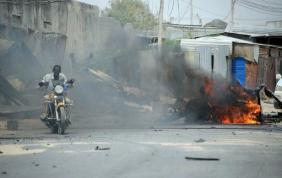|
A man rides a motorbike past a burning car shortly after it exploded on Feb. 13 near the entrance to Mogadishu’s international airport. Image from the AFP. |
Shabaab, al Qaeda’s branch in Somalia, carried out a high-profile suicide assault yesterday just outside the capital city Mogadishu. The attack targeted a UN convoy stopped at a checkpoint near the entrance to the Mogadishu airport, where a number of foreign diplomatic missions, including the African Union Mission in Somalia (AMISOM) and UN, have offices.
The convoy was headed back to the airport after having visited the UN Development Program facilities in Mogadishu, when a car filled with explosives rammed into two vehicles. According to a police official, the explosion occurred in front of a tea shop just outside the airport. Airport staff said there was a blast and that the “sky was covered with smoke.”
Abu Musab, the terror group’s spokesman, claimed the attack on behalf of the group, confirming that “this was an operation carried out by Shabaab. It was a brother who took a sacrificial act to defend the people of Somalia.” He also said that the UN was the target of the attack.
Another Shabaab representative reiterated that the target was a UN official headed to the airport, and threatened that the group would continue to target international institutions like the UN for as long as they stayed in Somalia. The spokesman warned all international organizations to leave Somalia or they too would become targets.
While Shabaab claimed that it had killed 13 people, including three UN staff, Nicholas Kay, the UN’s Special Representative of the Secretary-General for Somalia, said in a statement: “A UN car was damaged but no UN staff were injured. Four security escorts were lightly injured.” The attack is thought to have killed at least seven Somalis and wounded 15 more.
The international community reacts
The attack was condemned by both AMISOM and UN officials. The Special Representative of the Chairperson of the African Union Commission (SRCC), Ambassador Mahamat Saleh Annadif, declared that it was a “craven attack which is a classical display of Shabaab’s faltering capabilities.”
In a statement issued by his spokesman, UN Secretary General Ban Ki-moon reiterated his determination to “support the Somali Government in preventing such attacks and holding the perpetrators accountable.” The UN Security Council voiced “outrage” over the attack, and in a statement underscored its determination to stand by the people of Somalia as they seek peace and stability, reaffirming that this and other acts of terrorism will not weaken that determination.
Setbacks for the Transitional Federal Government
The UN is growing frustrated with Somalia’s Transitional Federal Government (TFG), however. The attack on UN personnel came just a day after a damning UN report came to light warning of “systematic abuses” by Somalia’s government that have allowed the diversion of weapons purchased by Somali authorities after the UN’s easing of an arms embargo on Mogadishu last year. According to Reuters, some of the arms believed to have been diverted were earmarked for Shabaab, and “a key adviser to the president, from his Abgaal sub-clan, has been involved in planning weapons deliveries to al Shabaab leader Sheikh Yusuf Isse … who is also Abgaal.”
Another setback for the TFG occurred today when Turkey announced that it has stopped direct budgetary support to Somalia, cutting off a major source of funding for the government. Turkey has backed the TFG with direct monetary aid, in contrast to Western governments that have pledged billions in aid but not in the form of direct budget support.
Are you a dedicated reader of FDD's Long War Journal? Has our research benefitted you or your team over the years? Support our independent reporting and analysis today by considering a one-time or monthly donation. Thanks for reading! You can make a tax-deductible donation here.









1 Comment
What do you expect when United Nations mandates its diplomatic convoy vehicles to operate unarmed and unprotected on known terrestrial routes? Surely, their negligible political presence is responsible for the deaths of the other local populous KIAs.